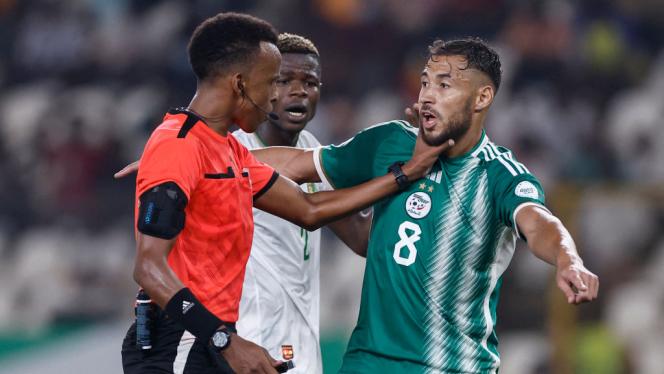Thursday 21 November 2024
Omar Artan: the no-nonsense referee who fired-up Somali fans at Afcon

Omar Artan’s presence at the tournament and his performances show that Somali football is on the right track
In a 2018 interview on Astaan TV, Somali referee Omar Artan said: “I have the desire and the confidence, and with the help of Allah, I will one day be invited to referee at the biggest tournaments and uplift Somalia on the global stage.” From early on, he showed steely determination to realise his goal: “Whatever you put your mind to, it is guaranteed that if you work hard and put in the right effort, you can achieve it.”
At that point he was plying his trade in the Somali Premier League, today known as the Somali national league. Six years later Artan found himself refereeing at the Africa Cup of Nations.
In a playful rebuke of Sir Alex Ferguson’s famous quip that “you can’t applaud a referee,” Somali fans at this year’s Africa Cup of Nations celebrated the stellar performances of their fellow countryman.
While Somalia has never qualified for a major tournament, Artan’s presence fired up Somali fans, offering them a chance to partake in Africa’s showcase tournament in Ivory Coast. This highlights the rapid progress of Somali football over the past two years, igniting hopes among Somali fans that the national team might soon make its own debut appearance.
One fan on X, formerly Twitter, posted: “we arguably gave AFCON one of the best officials in Omar Abdulkadir Artan. We do watch games he is officiating because of him.” Abdinoor Aden, a Somali journalist said: “Somalia might take years to qualify for Afcon, but one of its sons is one of the success stories.” The Eastleigh Voice described his debut as a “groundbreaking moment for Somali football.”
Even though it was Artan’s debut tournament, making history as the first Somali referee to officiate at a major tournament, he handled the pressure admirably. His success signifies Somalia’s commitment to comprehensive football development, both on and off the field. Notably, his presence contrasted with the absence of officials from traditional football powerhouses like Nigeria and Ghana, underscoring the significance of his achievement.
Artan’s love for football has been evident since his youth, though his true passion lay in refereeing. Despite enjoying playing the sport in his younger days, Artan’s heart was drawn to officiating matches. His dedication was such that he would often play a half of football before hurrying off to referee another game. Rapidly ascending through the ranks of refereeing in Somalia, Artan started with officiating friendly matches on local pitches before progressing to more competitive tournaments across the nation.
Remarkably, while still in his early twenties, he earned the esteemed opportunity to officiate games in both the Somali Premier League, marking the beginning of his illustrious journey. With each passing year, Artan notched remarkable achievements, steadily earning acclaim as one of the most respected referees in African football circles.
During this year’s Africa Cup of Nations, Artan officiated as the main referee in three games, served as the video assistant referee (VAR) in several others, and acted as the fourth official in additional matches. He earned praise continent-wide for his no-nonsense approach and accurate decisions.
One incident which went viral captured a confrontation between Artan and Algerian winger Youcef Belaili in the final Group D fixture between Mauritania and Algeria. Artan was uncompromising again during a fixture between Equatorial Guinea and Guinea-Bissau following a high foot which led to clashes between the two teams.
Such recognition has positioned Artan as a potential referee for the 2026 World Cup in North America.
His rise aligns more broadly with the return of the Somali national team. From training in hotel parking lots to state-of-the-art facilities in Morocco, Somali football has progressed significantly. While the current outcomes may not be ideal, the rapid growth of football within such a short time is remarkable and promising. Over the past two years, Somalia has participated in various competitions across four age groups, with the under-17s notably qualifying for the U17 Africa Cup of Nations and being crowned the champions of East Africa.
After decades of lacking a competitive national team, Somalia finally has a team worth following and being proud of. Previously, Somalia was often seen as just making up the numbers, but now, as Somali football fans, we can eagerly anticipate our country’s matches.
With a more competitive national team, opportunities for regular competitive matches have also increased. The Arab Cup is scheduled biennially, and the new World Cup qualifying format guarantees competitive fixtures every few months for the Ocean Stars, a prospect cherished by players and fans alike.
The enhancement of Somali national teams owes much to the federation’s new and improved recruitment approach. Over half of the recent squad is composed of players from abroad, mirroring the success of a country like Cape Verde in the Africa Cup of Nations. This strategic move involves casting a wider net globally to identify talent, resulting in the inclusion of players such as Yusuf Ahmed and Ismail Haji from Australia, the Malta-based Mohamed Awad, Abdulsamed Abdullahi in Montenegro, and Saaiqi Elmi and Mustafa Mohamed forming part of the Scandinavian contingent, among others. This influx of talent from diverse corners of the world not only enriches the national team setup but also promises long-term benefits for Somali football.
With Omar officiating at a high level, the under-17 team achieving success, and an increasing number of players from various leagues joining the national team, Somalia appears to be on a promising path. Building a successful national team takes time, but Somalia seems to be laying the foundation for potential success in the not-so-distant future.







